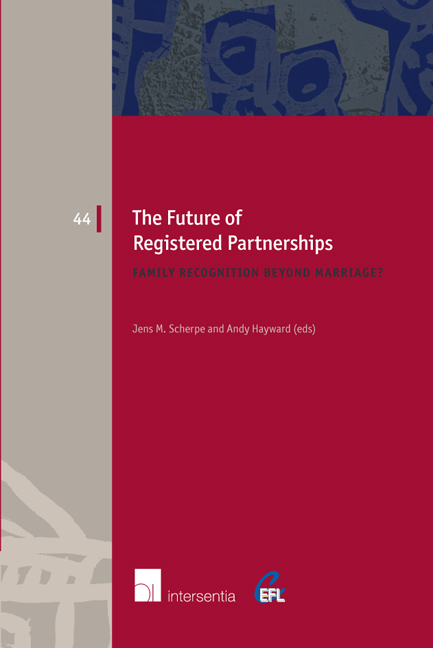Book contents
- Frontmatter
- Foreword
- Preface
- Contents
- List of Contributors
- The Future of Registered Partnerships: An Introduction
- Questionnaire
- Part I Registered Partnerships as a Functional Equivalent to Marriage
- Part II Registered Partnerships as an Alternative to Marriage
- Part III Registered Partnerships in a Time of Transition
- Registered Partnerships in England and Wales
- Registered Partnerships in Scotland
- Registered Partnerships in Northern Ireland
- Registered Partnerships in the Republic of Ireland
- Registered Partnerships in Greece and Cyprus
- Part IV Alternative Models for Registered Partnerships: Beyond Conjugality, Beyond Formality
- Part V Registered Partnerships, Discrimination and Human Rights
- Part VI Comparative Perspective and Conclusions
- Index
- European Family Law Series
Registered Partnerships in the Republic of Ireland
from Part III - Registered Partnerships in a Time of Transition
Published online by Cambridge University Press: 22 September 2018
- Frontmatter
- Foreword
- Preface
- Contents
- List of Contributors
- The Future of Registered Partnerships: An Introduction
- Questionnaire
- Part I Registered Partnerships as a Functional Equivalent to Marriage
- Part II Registered Partnerships as an Alternative to Marriage
- Part III Registered Partnerships in a Time of Transition
- Registered Partnerships in England and Wales
- Registered Partnerships in Scotland
- Registered Partnerships in Northern Ireland
- Registered Partnerships in the Republic of Ireland
- Registered Partnerships in Greece and Cyprus
- Part IV Alternative Models for Registered Partnerships: Beyond Conjugality, Beyond Formality
- Part V Registered Partnerships, Discrimination and Human Rights
- Part VI Comparative Perspective and Conclusions
- Index
- European Family Law Series
Summary
HISTORY AND BACKGROUND
BASIC STRUCTURES OF THE LAW ON ADULT RELATIONSHIPS
Prior to the enactment of the ground-breaking Civil Partnership and Certain Rights and Obligations of Cohabitants Act 2010, marriage was the only option available to a couple who wished to formalise their relationship and, until recently, that institution was restricted solely to opposite-sex couples. The marital family is expressly protected under Articles 41 and 42 of the Constitution of Ireland. Under Article 41.3.1 of the Constitution,
The State pledges itself to guard with special care the institution of Marriage, on which the Family is founded, and to protect it against attack.
Non-marital family units, whether same-sex or opposite-sex, are completely devoid of constitutional recognition and protection. However, the Civil Partnership and Certain Rights and Obligations of Cohabitants Act 2010 has provided statutory recognition and protection for same-sex registered partnerships and same-sex/opposite-sex cohabiting relationships since acquiring the force of law on 1 January 2011.
The 2010 Act enabled same-sex couples to enter into civil partnerships and established a ‘redress scheme’ for ‘qualified cohabitants’. The 2010 Act provides that cohabitants who have been living together for five years, or two years where there is a dependent child of the relationship, become ‘qualified cohabitants’, after which a ‘financially dependent’ cohabitant can apply to the court for certain relief upon termination of the relationship. Unlike marriage or civil partnership where the parties ‘opt in’ at the outset, cohabitation in Ireland is recognised retrospectively, and only then if certain criteria have been fulfilled. These criteria comprise the statutory time period(s) applicable before one cohabitant can seek redress from the other at the end of their relationship and the requirement that the applicant must be able to demonstrate that s/he was financially dependent on the respondent. The 2010 Act also allows all cohabitants to enter into enforceable cohabitation agreements to provide for financial matters during the relationship or when the relationship ends. Significantly, by virtue of one of these agreements cohabitants can contractually ‘opt out’ of the ‘redress scheme’ and avoid being subject to the rights and obligations associated with it. Section 202(3) of the 2010 Act states that a cohabitation agreement may exclude either cohabitant from seeking an order for redress. However, in order to be valid, an agreement between cohabitants must comply with certain formalities.
- Type
- Chapter
- Information
- The Future of Registered PartnershipsFamily Recognition Beyond Marriage?, pp. 277 - 300Publisher: IntersentiaPrint publication year: 2017

